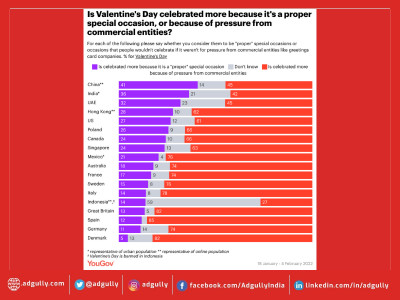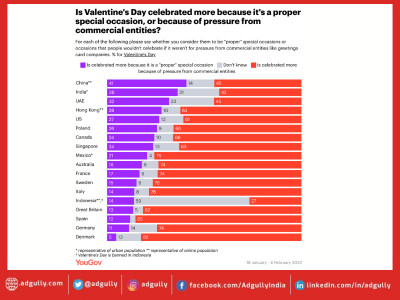Sustainability and ethical choices: A growth emphasis in V-Day marketing
Authored by Rajesh KV, Director, CAB Experiences
Valentine's Day 2024: Sustainability takes center stage
With Valentine's Day 2024, round the corner, brands are increasingly focusing on sustainable marketing, underscoring the growing demand for eco-conscious gifts and packaging as well as sustainable experiences. Sustainable marketing, an emerging trend in the industry emphasizes the importance of marketing products that are environmentally safe. The goal is to create and market products that are eco-friendly and don't compromise the ability of future generations to fulfill their needs. Brands that develop marketing strategies around this concept, are perceived as socially responsible entities. This ethical stance correlates to millennials who have a preference for an ecologically conscious way of life such as eating plant-based diets, utilizing renewable sources, avoiding single use plastics or supporting businesses pursuing a similar ethical approach. This is slowly but surely laying the foundation for a sustainable marketing ecosystem.
Changing marketing dynamics with Valentine’s day celebrations
Receiving and sharing gifts with your loved ones on Valentine’s day is a tradition, but how about extending the tradition to our planet! Reckoning this school of thought, brands have undergone a steep evolution in the past five years, in terms of marketing products that are ethically sourced, for Valentine’s day celebration. Today, it is not unlikely to find a multitude of websites and stores, promoting attractive ethically-centered gifting ideas and experiences. Crafting handmade cards, sourcing chocolates from cacao farms, visiting a local farmers market to source handmade baked goods or soaps or opting for handmade ethical jewelry, are just a few options to go the sustainable route! The changing patterns in demand, has opened opportunities for brands to shift their focus to campaigns that are driven by ‘sustainable marketing’.The changing dynamics of expressing love is driving brands to reform and harmonize their marketing strategies with ethical practices that strike a chord with the eco-savvy consumers. The brands that are in the lead of this change are not only meeting the consumer expectations but also effectively contributing to a more environmentally friendly market.
Ethical Marketing: A perspective
With the boom of social media platforms, every consumer has easy access to voice their opinion about a brand. The new age consumer is driven by morals and ethics and expects the same from a brand. Thus, brands must recognize the power of consumer voices amplified through social media and prioritize ethical practices to resonate with their audience effectively. A very recent example of a marketing campaign that received negative backlash was by actress Poonam Pandey, who adopted shock advertising, by staging her death, to raise awareness about cervical cancer. The campaign was perceived as demeaning and undignified and received major flak. It also set the tone for brands to craft campaigns that prioritize moral values and positive impacts rather than resorting to unethical practices for greater attention. The lesson was to align marketing strategies with ethics, to foster long-lasting and genuine connections with audiences, rather than to relent on tactics that will damage the brand image.
Customer engagement and recall value: Shift focuses from ROI to ROX (Return on investment to Return on Experiences)
Every responsible move made by the brand, whether it is utilizing eco-friendly materials, minimizing carbon footprint, or having ethically sound labor relations, will strengthen the brand identity. The visible effort helps largely to strike favorable associations with consumers who share the same values. Through the prism of sustainable marketing, the emphasis on providing end-to-end customer experiences aligns with the wider goal of an ethical and responsible business. It is about reflecting ethical considerations at each stage of consumer experience. The change of perspective from ROI to ROX in sustainable marketing is a manifestation of a more profound dedication to generating value beyond financial measures. It recognizes that achieving success means to go beyond corporate profits and to create experiences that are valuable, personalized, and in line with the notion of sustainability. Consumers interested in sustainable brands and products don't only choose green products but also look for genuine and relevant engagement and relationships with brands that have a positive social and environmental impact. Brands that prioritize ROX instead of ROI go an extra mile to bring about sustainable change and can expect heightened brand recall and engagement amongst their users. Ethical behavior by brands are capable of evoking positive emotions in their users, resulting in brand loyalty.
Measuring the financial impact of sustainable marketing strategies
With many companies intertwining sustainability with their marketing strategies, makes the measurement of their efficacy imperative. Sustainability metrics and KPIs offer a data-driven approach that helps to measure a company’s environmental and social responsibilities. Metrics become more important in today's world where the business that is sustainable is both appreciated and demanded by consumers. Sustainability metrics don’t just measure success; they determine it. Companies that adopt such measures not only demonstrate their commitment to the worldwide surge for sustainability but also set themselves apart as industry trailblazers, that will ultimately lead to a better tomorrow for everyone.


















Share
Facebook
YouTube
Tweet
Twitter
LinkedIn